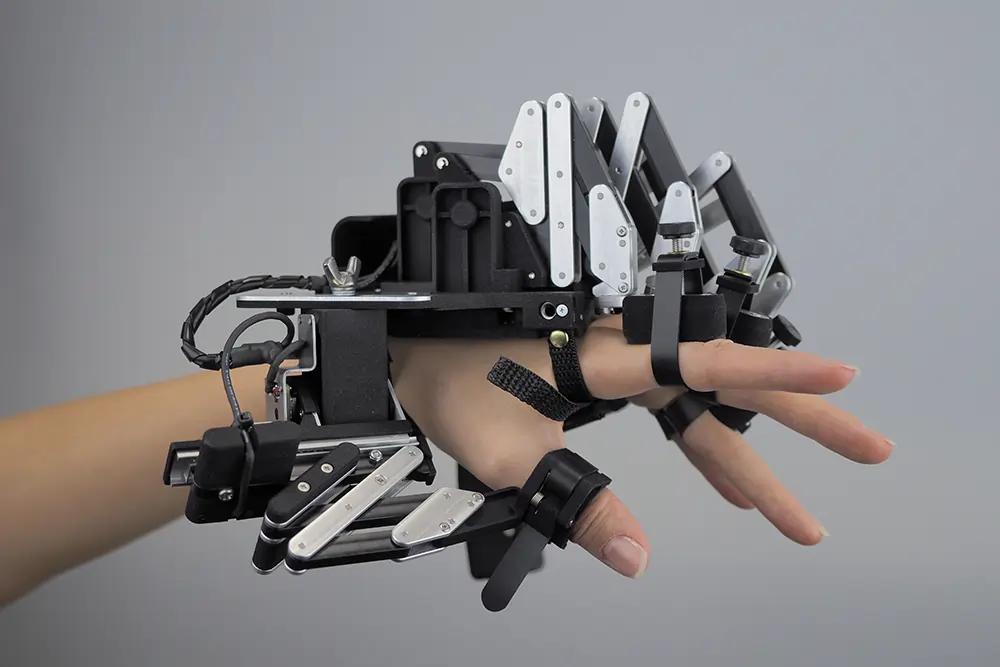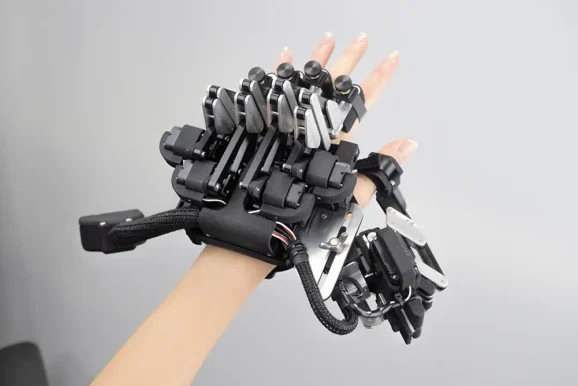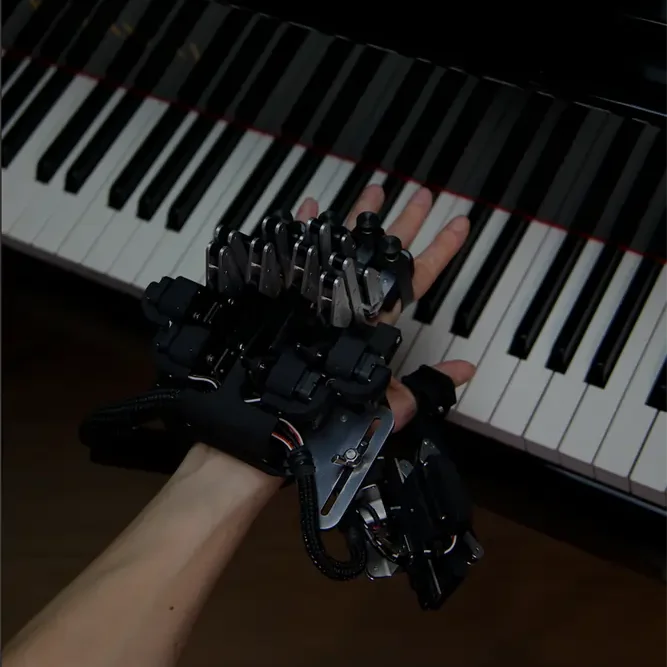Hey, presto! Robotic hand could be key to playing ‘faster and more complex’ piano

John E. Kaye
- Published
- News, Technology

Japanese researchers have created a robotic hand exoskeleton to help pianists play faster and more complex music
The device uses a motor at the base of each digit to move the wearer’s five fingers at speeds they could not reach themselves.
This stimulates the player’s brain and motor cortex, allowing them to execute the same swift hand movements even after removing it.

Experts at Tokyo’s Sony Computer Science Laboratories (Sony CSL) found that after using the exoskeleton, seasoned pianists were able to play music with a faster tempo – known as presto and prestissimo – than they could before.
Lead researcher Shinichi Furuya created the device to help musicians push past the “ceiling effect” – a player’s natural limit that cannot normally be improved on no matter how much they practise.
Until now, attempting to break through the ceiling can lead to repetitive strain-type injuries.
But training with the exoskeleton prevents physical damage because the musician is not using their own muscles to strike the keys.

The device could also help surgeons, e-sport gamers, and participants in other pursuits requiring dextrous, fast hand movements, Sony CSL said.
Their findings were published in the journal Science Robotics last month.
“Sony CSL has discovered that a new training method using an exoskeleton robot that moves individual fingers independently and at high speeds stably for long periods of time can break through the ceiling effect on the motor skills of a pianist’s fingers,” it said in a statement.
“The skilled subjects that the research team trained were highly skilled pianists wearing an exoskeleton robot to experience high-speed and complex finger movements that would be impossible to perform on their own.
“As a result, the trained pianists broke through the limits of performance skills that had plateaued under previous practicing and were able execute complex skills even more quickly.
“Moreover, skill improvement was also observed in the opposite hand, which had not received any exoskeleton robot training. These results appeared when the pianists played after the exoskeleton robot was removed, suggesting that the pianists’ own skills had improved.”
Pictures & video: © Sony Computer Science Laboratories, Inc.
RECENT ARTICLES
-
 These European hotels have just been named Five-Star in Forbes Travel Guide’s 2026 awards
These European hotels have just been named Five-Star in Forbes Travel Guide’s 2026 awards -
 McDonald’s Valentine’s ‘McNugget Caviar’ giveaway sells out within minutes
McDonald’s Valentine’s ‘McNugget Caviar’ giveaway sells out within minutes -
 Europe opens NanoIC pilot line to design the computer chips of the 2030s
Europe opens NanoIC pilot line to design the computer chips of the 2030s -
 Zanzibar’s tourism boom ‘exposes new investment opportunities beyond hotels’
Zanzibar’s tourism boom ‘exposes new investment opportunities beyond hotels’ -
 Gen Z set to make up 34% of global workforce by 2034, new report says
Gen Z set to make up 34% of global workforce by 2034, new report says -
 The ideas and discoveries reshaping our future: Science Matters Volume 3, out now
The ideas and discoveries reshaping our future: Science Matters Volume 3, out now -
 Lasers finally unlock mystery of Charles Darwin’s specimen jars
Lasers finally unlock mystery of Charles Darwin’s specimen jars -
 Strong ESG records help firms take R&D global, study finds
Strong ESG records help firms take R&D global, study finds -
 European Commission issues new cancer prevention guidance as EU records 2.7m cases in a year
European Commission issues new cancer prevention guidance as EU records 2.7m cases in a year -
 Artemis II set to carry astronauts around the Moon for first time in 50 years
Artemis II set to carry astronauts around the Moon for first time in 50 years -
 Meet the AI-powered robot that can sort, load and run your laundry on its own
Meet the AI-powered robot that can sort, load and run your laundry on its own -
 Wingsuit skydivers blast through world’s tallest hotel at 124mph in Dubai stunt
Wingsuit skydivers blast through world’s tallest hotel at 124mph in Dubai stunt -
 Centrum Air to launch first European route with Tashkent–Frankfurt flights
Centrum Air to launch first European route with Tashkent–Frankfurt flights -
 UK organisations still falling short on GDPR compliance, benchmark report finds
UK organisations still falling short on GDPR compliance, benchmark report finds -
 Stanley Johnson appears on Ugandan national television during visit highlighting wildlife and conservation ties
Stanley Johnson appears on Ugandan national television during visit highlighting wildlife and conservation ties -
 Anniversary marks first civilian voyage to Antarctica 60 years ago
Anniversary marks first civilian voyage to Antarctica 60 years ago -
 Etihad ranked world’s safest airline for 2026
Etihad ranked world’s safest airline for 2026 -
 Read it here: Asset Management Matters — new supplement out now
Read it here: Asset Management Matters — new supplement out now -
 Breakthroughs that change how we understand health, biology and risk: the new Science Matters supplement is out now
Breakthroughs that change how we understand health, biology and risk: the new Science Matters supplement is out now -
 The new Residence & Citizenship Planning supplement: out now
The new Residence & Citizenship Planning supplement: out now -
 Prague named Europe’s top student city in new comparative study
Prague named Europe’s top student city in new comparative study -
 BGG expands production footprint and backs microalgae as social media drives unprecedented boom in natural wellness
BGG expands production footprint and backs microalgae as social media drives unprecedented boom in natural wellness -
 The European Winter 2026 edition - out now
The European Winter 2026 edition - out now -
 Parliament invites cyber experts to give evidence on new UK cyber security bill
Parliament invites cyber experts to give evidence on new UK cyber security bill -
 EU sustainability rules drive digital compliance push in Uzbekistan ahead of export change
EU sustainability rules drive digital compliance push in Uzbekistan ahead of export change



























